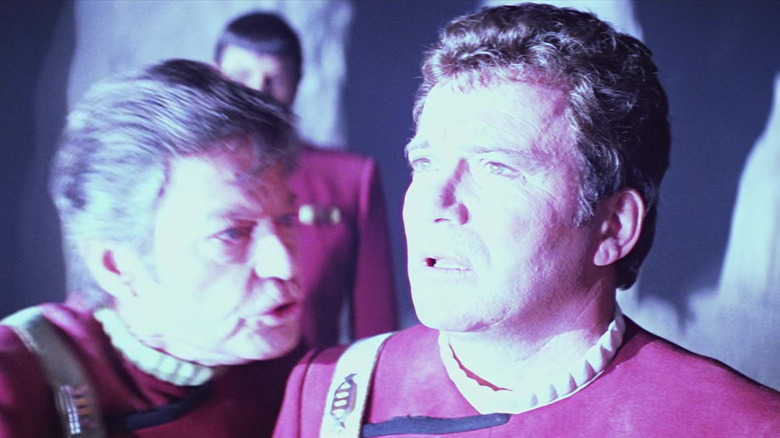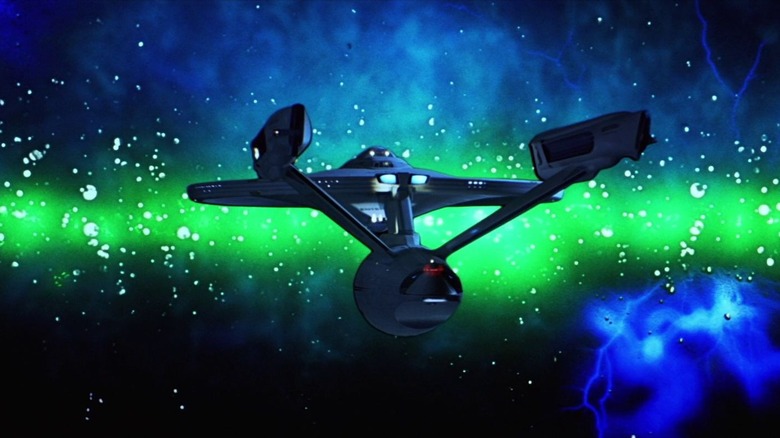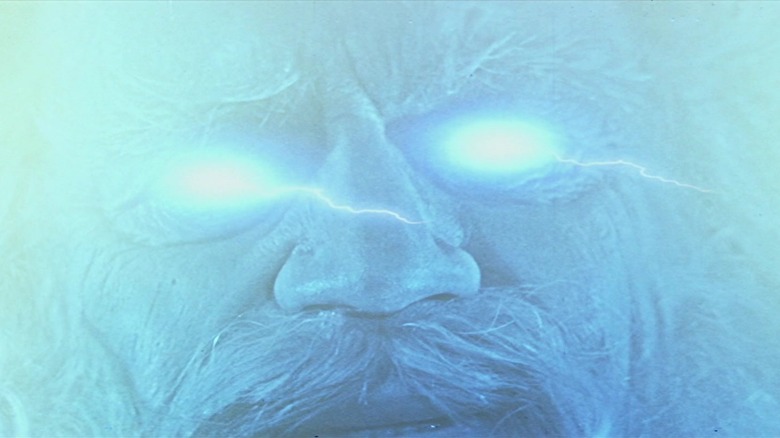Why Star Trek V: The Final Frontier Producer Blames William Shatner For The Film's Failure
Going back to 1966, "Star Trek" co-stars William Shatner and Leonard Nimoy had what was called a "favored nations clause" in their contracts. The clause ensured that whenever one actor got a raise, or perhaps input into a script, the other one would get the same. This was done to comfort two actors who were constantly butting heads as to who the real "star" of "Star Trek" was. The favored nations clause made sure that neither actor could "pull ahead" of the other.
The clauses were still in place by the 1980s, so when Nimoy was hired to direct "Star Trek III: The Search for Spock" (1984) and "Star Trek IV: The Voyage Home" (1986), Shatner was able to pull rank. Thanks to a pay dispute on "Star Trek IV," Shatner could contractually elbow his way into the director's chair for 1989's "Star Trek V: The Final Frontier." Not only that, but Shatner was also allowed to dictate story ideas and write treatments; Shatner has a story-by credit on "Frontier" as well. Patience, dear reader, as we shall describe the story in a moment.
Many will hasten to point out that "The Final Frontier" is often considered the worst of the extant 13 "Star Trek" movies. The script was clumsy, as it was constantly being re-written to placate the cast (the bulk of the film's $33 million budget went to talent). Moreover, the 1988 writers' strike cut into pre-production and Paramount couldn't afford its usual team of visual effects wizards from Industrial Light & Magic, forcing the studio to hire a cheaper technician on the fly. Constant budget cuts also made the film look cheap. There were myriad other production troubles besides.
According to a 1993 interview with Star Trek Explorer Magazine, "Frontier" producer Harve Bennett blames every problem directly on Shatner (who had final story approval). Bennett felt that Shatner's ultimate decision to make a "Star Trek" film about finding the physical location of God (!) was foolhardy. Shatner's decisions, Bennett argued, were bad from the start.
The story of Star Trek V
The story of "Star Trek V" is a little strange for the franchise. A hippie-like Vulcan cult leader named Sybok (Laurence Luckinbill) has the ability to psychically reach into the minds of his followers, erase their pain, and turn them into loyal followers. Sybok stages an elaborate scheme to lure the U.S.S. Enterprise to a certain planet where he will be able to hijack it and take it on a personal mission. Spock, we later learn, is unable to stand up to Sybok as he is Spock's half-brother.
And what was Sybok's personal mission? It seems he learned that the very center of the Milky Way galaxy is the physical home of the one true God. He aims to sail to the galactic core (in reality, a supermassive black hole) and speak to God in person. This contradicts "The Magicks of Megas-tu" (October 27, 1973), an episode of "Star Trek: The Animated Series," which depicted the Devil living at the center of the galaxy, but only deep-cut Trekkies are bothered by that. "Star Trek V" climaxes with Kirk, Sybok, and several others actually meeting God, or at least an alien claiming to be God.
To Bennett's eyes, this was a poor story from the jump. He was quoted as saying:
"I would say that 'Star Trek V' was the weakest of the pictures, both in terms of coherency and its box office, and [what] I would say without shirking responsibility is that the problem was Bill had story approval. [...] He knows this, so I'm not ratting on my friend, but basically, we got to a point where I said, 'Bill, we cannot make a movie about finding God!' I said that from the beginning."
Bennett also felt that there was no way "Star Trek" would actually introduce God as a character, so the search for the Divine, he felt, had an ending everyone could predict.
Kirk vs. God
Bennett was succinct:
"I know that if you say in a TV logline, 'Tonight on 'Star Trek,' the crew of the U.S.S. Enterprise goes to find God,' everybody knows we're not going to go there. So as a storyteller, it gets to be a shaggy joke!"
It's worth stating that "Star Trek" takes place in a post-religious, wholly secular world where humans no longer appear to worship or believe in a God being. Show creator Gene Roddenberry was openly atheist and wanted "Star Trek" to rid itself of any notions of God. "Star Trek V" didn't start with a bad idea, thematically — a conflict between two men with very different views of infinity — but the actual physical search of God seemed silly and overblown to Bennett.
The producer also recalled Shatner's blood-minded insistence on the idea, though, stating he eventually had to wash his hands of the entire affair:
"He wanted to do it, so after much aggravation, I said, 'All right, we're going to go find God, but we're going to make it the best trip we possibly can!' [...] It was doomed by its premise. [...] I learned long ago, if it ain't in the premise, it ain't there, but Bill felt if we worked hard enough and dazzled them with enough stuff, we could do it, and I don't think we pulled that off [...] I think a faulty premise results in a flawed picture."
The premise was flawed and, unfortunately, there wasn't enough money on the table to dazzle audiences either. "Star Trek V" hasn't undergone any sort of fan re-litigation since its release in 1989, and it remains the worst of the "Star Trek" movies. Was it Shatner's fault? It's easy to point fingers in his direction. To his credit, Shatner has apologized.


